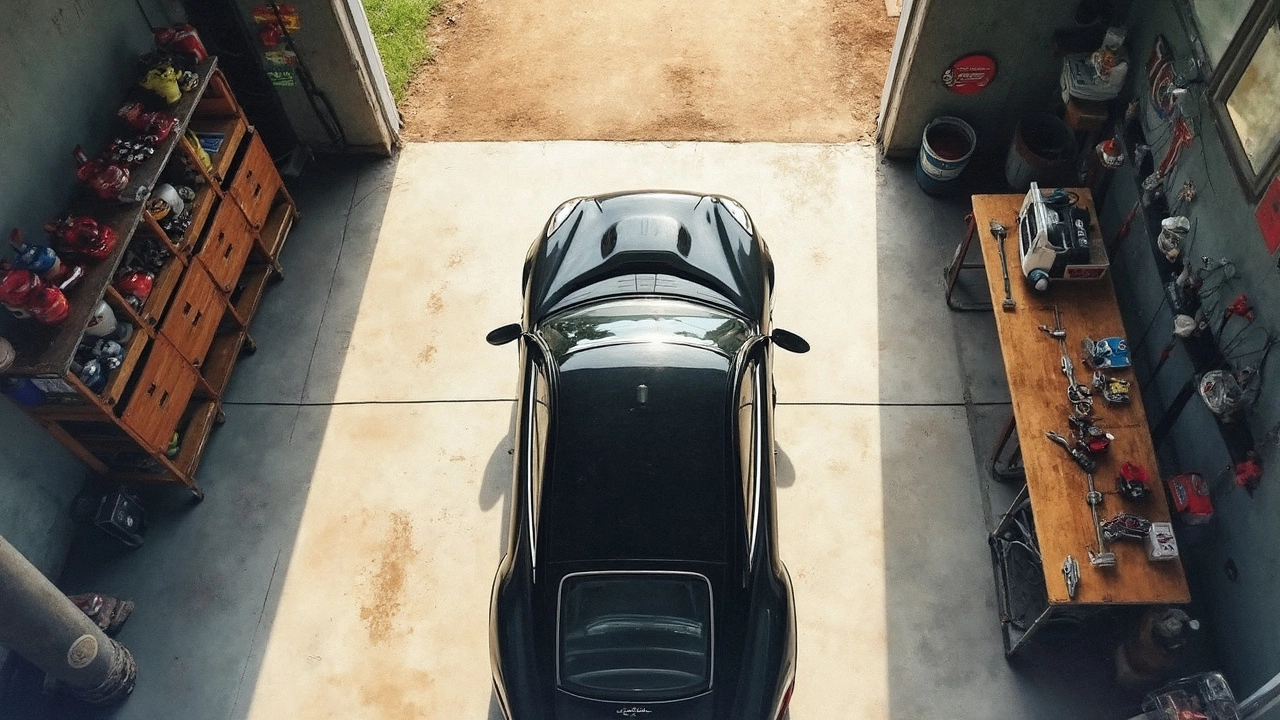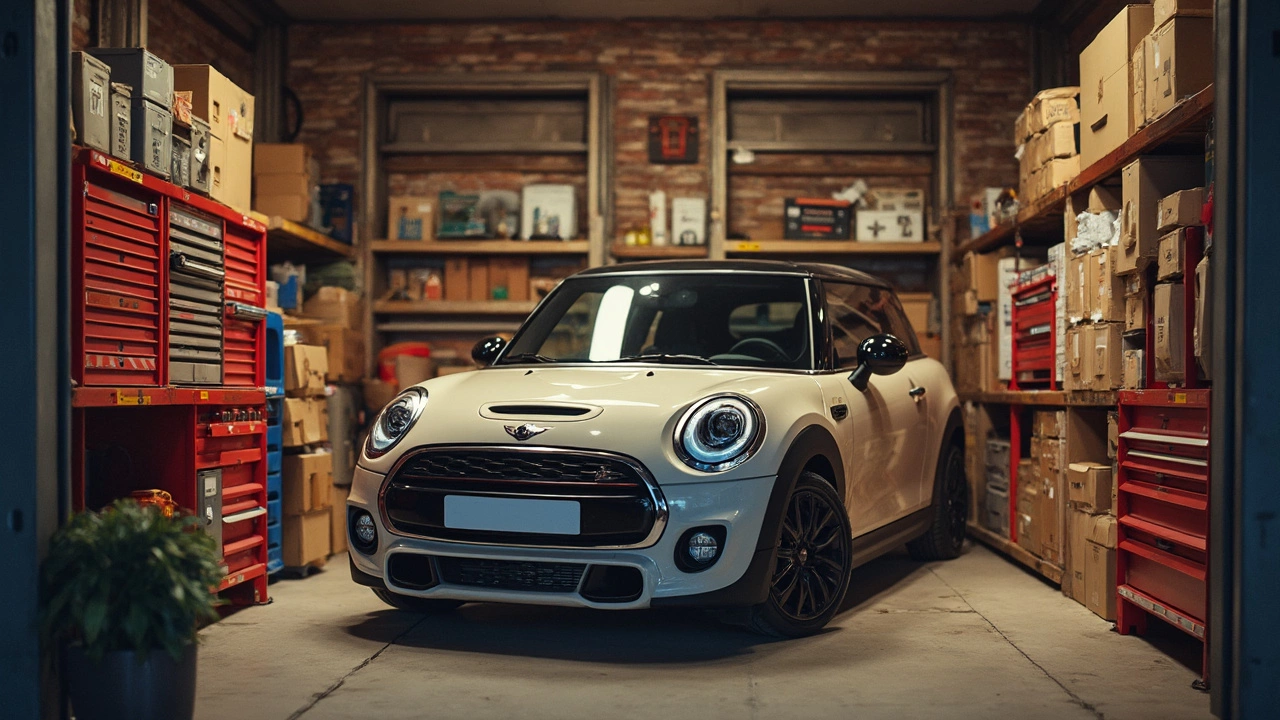So, you've got a 10x20 storage unit and you're wondering, can my car fit in there? Let's break it down. A 10x20 unit is typically 200 square feet of space, which sounds like a lot on paper. It's roughly the size of a one-car garage.
But not all cars are created equal. While most sedans, compact SUVs, and even some small trucks can slide in just fine, those with larger vehicles like full-size SUVs or trucks might face a squeeze. It's all about the make and model of your ride. Measuring your car before committing to the unit is a smart move.
- Understanding the 10x20 Storage Unit
- Types of Cars That Will Fit
- Tips for Optimizing Space
- Preparing Your Car for Storage
Understanding the 10x20 Storage Unit
The 10x20 storage unit is one of the most popular choices for both personal and commercial use. With a space of about 200 square feet, it's comparable to a typical one-car garage. This is why it's a go-to option for people looking to store vehicles, household items, or business inventory.
Storage units typically have ceilings that can reach up to 8 feet, giving you a bit of extra wiggle room vertically. This means you can stack boxes or perhaps a smaller workbench if needed. Just make sure to keep ventilation in mind, especially if you're storing a car.
The Typical Dimensions
When folks say a unit is 10x20, we're talking about general interior space—it's essential to remember that. Realistically, the inside might be a tad less due to walls and door frames. However, you're generally looking at space big enough to park many kinds of vehicles or store the contents of a multiple-bedroom home.
10x20 for Vehicle Storage
While the average sedan fits quite comfortably in a 10x20 unit, some vehicle types are better suited than others. Compact SUVs, smaller trucks, and even motorcycles share the space easily. But if you have a larger SUV or a full-sized truck, double-check your vehicle's dimensions before deciding.
Here's a tip: When measuring your car, don’t forget about side mirrors and any additional attachments like tow bars, which might need extra space. And think ahead to how often you're going to need access. You wouldn’t want to stuff the unit so full that squeezing past the car becomes an obstacle course!
Facts and Figures
| Item | Estimated Space Coverage |
|---|---|
| Sedan | 150 sq ft |
| Compact SUV | 170 sq ft |
| Full-sized SUV | 190 sq ft |
In essence, the 10x20 storage unit is versatile. Whether you're storing a car, personal belongings, or business goods, it provides ample space. Just keep in mind the dimensions and ensure you have a little buffer for easy access and ventilation. Happy storing!
Types of Cars That Will Fit
Let's get into the nitty-gritty of what vehicles can comfortably slide into a 10x20 storage unit. A lot depends on the make and model, but this size is typically perfect for most standard vehicles.
Standard Sedans
If you're driving a sedan, chances are you're in luck. Most sedans, like the Toyota Camry or Honda Accord, span about 15 feet long, leaving plenty of room to maneuver and even stash a few extra items like bikes or boxes.
Small SUVs and Pickups
Got a compact SUV or a small truck like a Ford Escape or Chevy Colorado? These vehicles usually fit snugly in a 10x20 unit. However, if you've got roof racks or non-standard accessories, you might need to make adjustments or remove them.
Sports Cars
Love your zippy sports car? Sleek vehicles like the Porsche 911 or Mazda MX-5 not only fit but leave tailwind in style. These cars often measure under 14 feet, so no worries about the doors cramping up.
What's a Tight Squeeze?
Larger vehicles—think full-size SUVs like a Chevy Tahoe or big pickups like a Ford F-150—might just hit the limit. Measuring in advance can confirm if you'd need to opt for larger storage solutions.
| Car Type | Average Length (ft) |
|---|---|
| Sedan | 15 |
| Compact SUV | 16 |
| Sports Car | 14 |
| Full-size SUV | 18 |
So, before you commit, grab a tape measure and get precise about your car's dimensions. Ensuring it comfortably fits in a 10x20 unit will save a logistical headache down the road.

Tips for Optimizing Space
Got a 10x20 unit and worried about fitting your car? Don't stress. There are a few clever tricks to help make the most of the space you have. A bit of planning can go a long way in squeezing every inch out of your unit.
Measure Before You Commit
First things first, measure your vehicle. Get the length, width, and height down to the inch. Remember, a 10x20 unit gives you 10 feet wide by 20 feet long, but actual usable space may be a little less because of the walls and entrance size. Ensuring your measurements fit comfortably allows room for maneuvering.
Maximize Vertical Space
If there's still some headroom left after parking, consider using the height. Install shelves along the walls to store tires, fluids, or miscellaneous car gear. Just keep it clear of the vehicle itself. If external storage solutions are too expensive, DIY options can be a lifesaver.
Declutter Before Storing
This is a biggie! Empty your car of any non-essentials. Leaving stuff in there not only fills up space, but it can become a surprising source of clutter. Plus, you reduce the risk of attracting pests. Think of it as a fresh start both for the car and your storage unit.
Use Covers and Protectors
They're not just for aesthetics. Covers can protect your car from dust and moisture. If you've got extra space, floor mats can keep the unit clean and provide a layer of insulation for your vehicle from cold concrete.
Optimize Storage Strategy
- Start by placing the car inside first, aligning it to one side to maximize the remaining space.
- Use corners for stacking light yet bulky items.
- Opt for clear, labeled bins for smaller items to keep things organized and easily retrievable.
With these handy tips, you'll be amazed at how effectively you can use a 10x20 unit, not just for your car, but for so many other items as well!
Preparing Your Car for Storage
Getting your car ready for a storage solution like a 10x20 unit isn't just about driving it in and calling it a day. It's important to take a few precautionary steps to ensure your vehicle remains in top condition while it's tucked away.
1. Clean Your Car
Start with giving your car a good wash. Dirt and grime left on the paint can lead to scratches or damage, especially after sitting for a long time. A clean car also means you won't be surprised by any mysterious odors when you take it out of storage.
2. Change the Oil
Old oil can corrode the engine if left sitting too long. So, if you're planning on using the storage unit for more than a month, it's a smart move to swap out the oil and filter beforehand.
3. Top Off the Tank
Fill up your gas tank to prevent moisture from accumulating inside and to keep the seals from drying out. Adding a fuel stabilizer can also help to keep the gas fresh.
4. Maintain Battery Health
A battery left alone for a long duration without use will lose its charge. Consider disconnecting the battery, or if your storage unit has power access, use a trickle charger to maintain it.
5. Tires Check
Make sure your tires are inflated to their recommended PSI. Over time, tires can develop flat spots; to avoid this, you can use tire jacks or, if space allows, move the car slightly every few weeks.
Bonus Tips
- Invest in a good-quality car cover to protect against dust and moisture.
- If storing for a really long time, consider adding an emergency kit with basic tools and a first-aid kit inside the car.
- Check brake and other fluid levels.
Preparing your car storage smartly will save you time and potentially costly repairs down the line!







